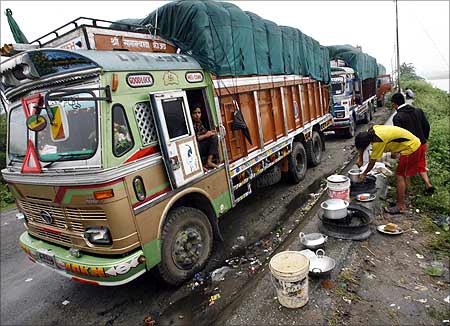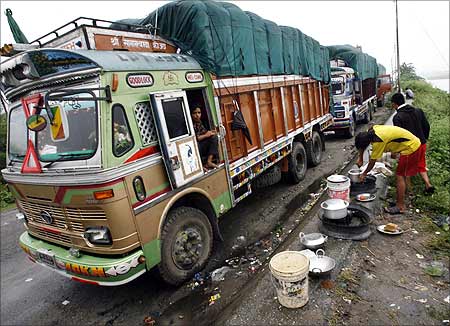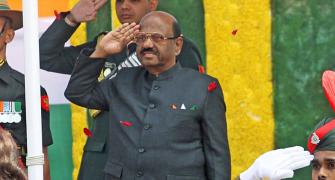 Draft law sets Rs 10 lakh annual turnover threshold; E-commerce firms to pay tax at source; All states on board, except Tamil Nadu
Draft law sets Rs 10 lakh annual turnover threshold; E-commerce firms to pay tax at source; All states on board, except Tamil Nadu
Individuals and entities with an annual turnover of Rs 10 lakh or more could soon be under goods and service tax laws, widening the tax base of the government, according to the draft central and integrated laws released on Tuesday.
According to the proposal of the draft laws, in the northeastern states the threshold is even lower at Rs 500,000.
The draft laws also propose collection of taxes at source for e-commerce companies, including aggregators, and simplify the definition of “services” to include intangibles such as software and work contracts.
These were released on the Union finance ministry website for public feedback, hours after a meeting of the Empowered Committee of Finance Ministers on GST.
All states except Tamil Nadu were on board, Union Finance Minister Arun Jaitley told reporters.
According to the draft laws, GST shall apply to all intra-state supply of goods and services. While the supplier of goods will have to bear the tax burden in most cases, the recipient might also have to bear it in some.
Experts said releasing the draft GST laws was a positive step, as these clearly define the contours of the tax regime.
“The government releasing the draft GST laws in public domain is a positive step. It shows the intent of the Centre to implement it by April 1, 2017,” said Rakesh Nangia, a senior partner at tax consultants Nangia and Co.
Including individuals and entities with turnover of Rs 10 lakh (Rs 1 million) -- Rs 500,000 in the Northeast -- in the GST purview has raised eyebrows.
“The current threshold for excise is Rs 1.5 crore (Rs 15 million).
"Hence, many more businesses would come under the central tax net. Industry was hoping for a higher threshold of at least Rs 25 lakh,” said Pratik Jain, a tax consultant with PwC India.
"The laws also state that e-commerce companies shall, out of the money owed to suppliers of goods, keep aside specified amounts in lieu of GST deducted at source, at rates recommended by the taxman.
“This will mean significant compliance burden on e-commerce companies, as many of them deal with thousands of vendors.
Further, this may lead to refund situation for many suppliers who operate on thin margins,” Jain said.
But the clarity of the draft laws has been appreciated.
Sachin Menon, chief operating officer (tax), KPMG, said: “It is one step closer to GST and it puts to rest all the confusion around what the definition of goods or service under the law should consist of.”
Schedule-II of the draft laws states transfer and transportation of goods in lieu of current or future payment, business assets and selling of assets to pay debt shall be treated as “goods”.
“Services” shall include leasing or renting of land or property, goods being sold for purposes apart from business, rent, real estate construction with the intention of sale or lease and transfer of intellectual property rights.
In Kolkata, West Bengal Finance Minister Amit Mitra, who heads the empowered committee, said there was 'general consensus' on the contentious issue of dual control of the taxation structure between the states and the Centre.
“We raised the issue of dual control. There was a consensus that for turnover above Rs 1.5 crore, states will have control on GST.
"Above Rs 1.5-crore (Rs 15-million) turnover, there will be dual control.
"This will be beneficial for small business,” he said, adding the matter would again be discussed at the next meeting in July.
The two-day meeting in Kolkata is being attended by finance ministers of 22 states as well as chief ministers of Arunachal Pradesh and Meghalaya and the deputy chief minister of Delhi, and senior officials.
At the end of the first day, Jaitley said: “Virtually all the states have supported the idea of GST today barring Tamil Nadu which has expressed some reservations. It has offered a few a suggestions which have been noted by the committee.”
“The fact that the draft law was released shows that the states were on board for almost all the issues,” said Menon of KPMG.
The draft laws were shared with the state finance ministers as well.
FM Jaitley said there was consensus among states that there would be no constitutional cap on GST rates.
Congress has been demanding that there should be a cap on the GST rate and it should be included in the Constitution Amendment Bill. The Bill has been stuck in the Rajya Sabha for some time.
Two other issues widely discussed in the meeting were the calculation of the revenue neutral rate and the management of taxation structure in the perspective of the dual control of the Centre and state.
Chief Economic Advisor Arvind Subramanian will also make a presentation on the revenue neutral rate calculation in July.
“While the principal advisor to the FM has suggested 17 per cent revenue neutral rate, another research institute has suggested 26.5 per cent.
"Given the divergence in views, the empowered committee of the finance ministers will meet again in July to discuss the two issues, the dual management and the RNR,” said Mitra.
In the meantime, the government will also form a committee and present a report on the acceptable RNR, he added.
Presentations would be made by the principal advisor to the finance minister and the National Institute of Public Finance and Policy.
Jaitley said for five years, if there is any loss of revenue to the state, it would be the liability of the Centre to compensate for it. He added the Centre is flexible on the issue of additional one per cent tax for two years as a compensation to the manufacturing states.
WHAT NEXT?
With the empowered GST committee of state finance ministers making headway in Kolkata, the road ahead becomes clearer:
In the House: The Constitution Amendment Bill for the Goods and Services Tax will be taken up by the Rajya Sabha in the Monsoon session. The Lok Sabha has already cleared it
In the states: At least 50% of the state legislatures have to ratify the Bill. After Tuesday’s meeting, all states expect Tamil Nadu are on board, claimed Finance Minister Arun Jaitley
For the public: The draft GST law is in the public domain for feedback
To be a law: The Lok Sabha has to pass it. The states have to pass their own GST laws
Three hurdles: 1% per cent inter-state additional levy: Congress wants it abolished. BJP held out for sometime but Jaitley said on Tuesday the Centre would be flexible on this
Cap on GST rate in the Bill: Congress wants the cap to be a part of the Bill. Govt feels it should not be in the Bill, as the Constitution would need to be amended for any future change
Dispute resolution: States seeking authority to assess and resolve cases below Rs 1.5 crore, taking majority of the service tax cases from the Centre. Meeting in July to discuss this -- though the Centre might relent
Current rollout target: April 1, 2017
The image is used for representational purpose only. Photograph: Reuters










